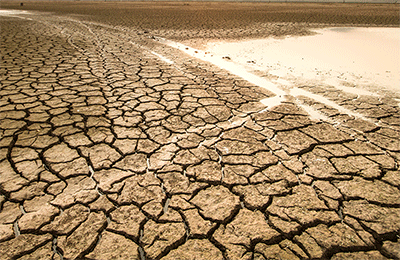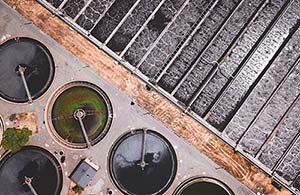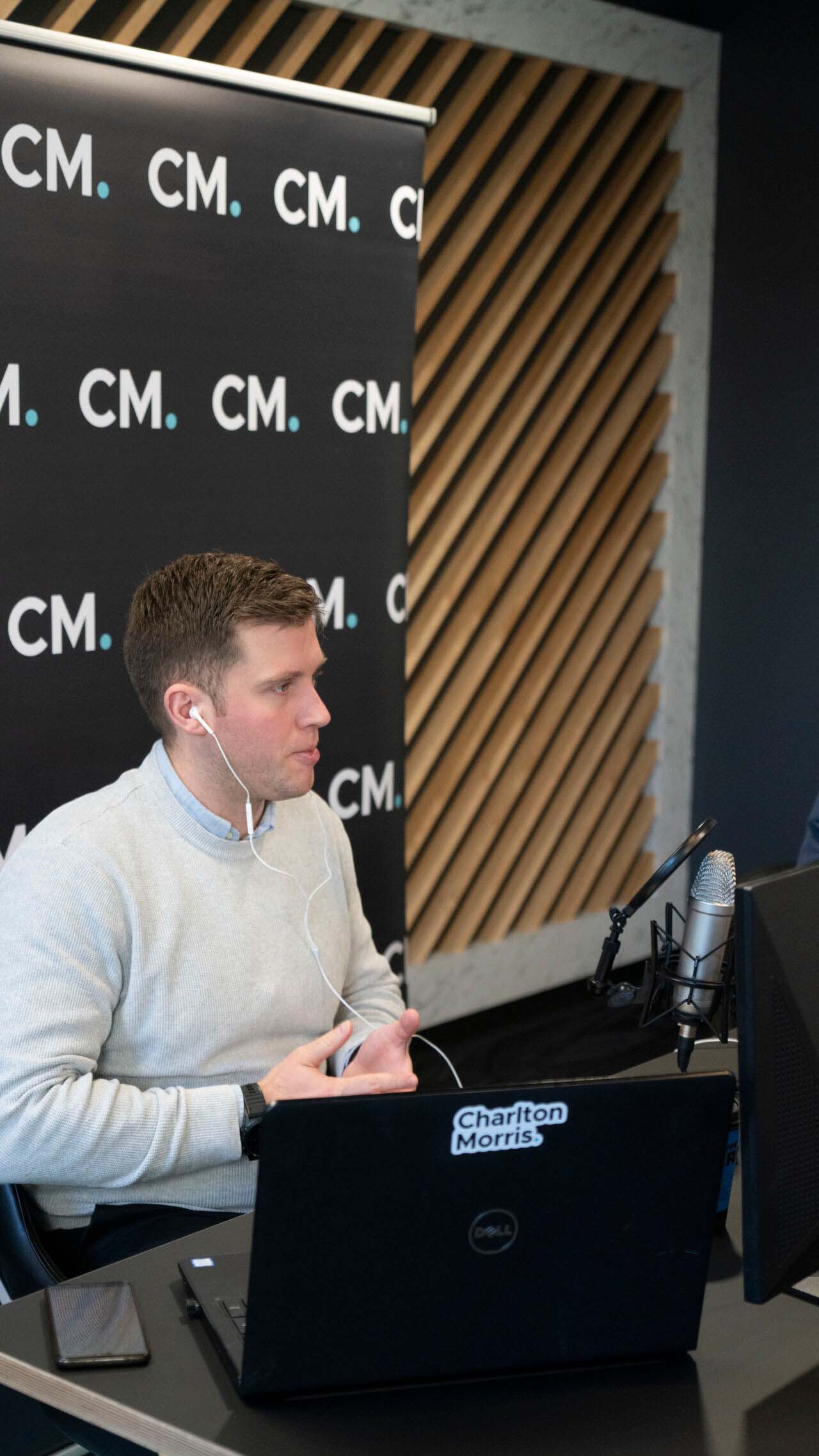.jpg)
.jpg)
"We're the match.com of the Water Industry."
.jpg)
Dean Amhaus, President and CEO of The Water Council
For the latest instalment of the CM Conversations podcast, I spoke to Dean Amhaus who has been President and CEO of The Water Council for the last 10 years.
The Water Council is a non-profit organization, headquartered in Milwaukee, Wisconsin, US, dedicated to solving global water challenges by supporting innovation in freshwater technology and driving these solutions to the industries that need them.
In our conversation, Dean explained to me how the council had become “the match.com of the water industry" through its work connecting companies, universities and technologies to breed innovation within water.
He also discussed the council’s Tech Challenge, what it’s like working with sponsors A. O. Smith, Badger Meter and Zurn, success stories with OxyMem and Hydroloop, plus future innovations in the industry.
Listen to the podcast here or keep reading for the Q&A article.
How did you get into the water industry?
I literally fell into water, not to use a pun. It was not a career choice. My previous background was involved in government relations. I ran a couple of agencies with the state of Wisconsin and I worked in Washington, DC for almost a decade.
When I was working with an organization called Spirit of Milwaukee, we were marketing Milwaukee in the state of Wisconsin, which if your listeners are not aware, is probably about an hour and a half North of Chicago.
During that tenure, the Milwaukee region was going through a regional economic development effort to try and pull the seven counties together to work in a more cohesive fashion and attract businesses.
We assessed the key industries in the region, which unsurprisingly included advanced manufacturing financial services. What was slightly more unexpected was Milwaukee’s propensity around water and specifically water technology.
A lot of businesses were running under the radar because there was no NAICS code for water technology. For a big consulting firm, if there's no code, then there is no industry. So, we were fortunate enough to dig a little bit of a deeper than them and recognize that we had companies like Kohler and A. O. Smith and Badger Meter.
We initially thought there were 50 water companies, but there are now over 240 within our region. This isn’t just ones we’ve discovered along the way, but others that have come to Milwaukee region to set up their operations.
There’s a huge amount of water activity within this relatively small city. Why Milwaukee?
It goes back to the breweries. Milwaukee was very well known for the breweries that existed here and what they needed were suppliers to be able to process and clean water. So, you can trace a lot of the roots of our businesses to the brewing industry.
These breweries have for the most part gone. One of the only ones left is the big one, Molson Coors. However, the water suppliers kept on evolving and growing, adopting new opportunities.
The big change for Milwaukee and certainly for the US was when The Clean Water Act came into play. Many big water users were misusing water and needed new technologies to help them change. Again, this increased demand was a big trigger for further advancement of our industry cluster within Milwaukee.
How did The Water Council start?
We found that we had this industry here in Milwaukee and I should emphasize that it's not just businesses, but we've got great utilities here too - ones that are known on a global scale. We have university and academic programs focused around water, in sciences and engineering, as well as law in business. We saw all these different components within the region and saw the opportunity.
We had two CEOs of companies. One was Richard Meeusen who was the CEO of Badger Meter at the time and the other was Paul Jones, who was with A. O. Smith Corporation. They became sort of the igniters of The Water Council. The idea was to bring together the industry and academia, with utilities and start to collaborate and start to work together.
So, we formed The Water Council: an organization driven by the private sector to coalesce all these water tech assets. It was really from the foundation of, could we help the businesses here in Milwaukee grow? Could we attract other new companies to come to work in the Milwaukee region? Could we support start-up companies too? And could we breed innovation by finding new technologies from creators and start-ups to support big companies?
We also wanted to focus on talent. Obviously, all these companies are looking for talent and they're looking for new innovations coming from that talent, whether it being from universities or entrepreneurs. So, could this be a pipeline for businesses to work together with these people in a uniform program? This was the genesis of the water council.
So, what’s The Water Council’s Tech Challenge all about?
The tech challenge started up two years ago. This came from the vice presidents for engineering and innovation from the three primary company sponsors: A. O. Smith, Badger Meter and Zurn. They knew a lot of things that are going on within the innovation world and had people looking for things all the time, but they wanted to know if they were missing something. They wanted to know how they could get ahead of their competitors.
So, we started this challenge. We typically have one to two challenges on a particular topic. Instead of thinking on a grand scale saying ‘solve P FOS’ or ‘solve blue LG’ which are big, big issues; our challenges are narrow and focused. That means they might look at a particular sensor or a particular artificial intelligence component or a battery that would be fed into the innovation process of a particular company.
We've completed three rounds so far. From these, we've had six different topics and with 38 start-ups selected from those as either winners or finalists. What's most important for this is that 27 of these 38 companies have had ongoing conversations with the three sponsors. We do have a cash prize. It's not a huge amount of money for each award winner, but I think this is a bit like America's got talent. Everybody wants to win, but when you're out there performing, what you really want is the recording contract because that's where the real money is.
For us, you can win the competition, but what you really want is that ongoing relationship with the tech sponsor. That’s where you're going to be able to license your product. That's really where everybody is going towards. So, those ongoing active conversations are the most critical components of this.
Of the companies we've brought to our sponsors, over 42% are new to them. That really speaks volumes for us, highlighting our ability to find new innovators - whether they be within a business, an entrepreneur, a university, or somebody literally working out of their garage.
It just so happens that we've got a challenge that is open for applications right now if anyone is interested in applying.
What’s it like working with the sponsors in the challenge?
What’s been really valuable – and frankly, a big surprise – is that the three sponsors actually do this together. So, when they are coming up with the topics they collaborate.
What we're finding is that a company like A. O. Smith, who's interested in water filters, may be exposed to some other ideas by a Badger Meter or a Zurn. The challenge opens their world to new possibilities.
We're certainly open to welcoming more sponsors to join the three that we have. And we definitely would like to have more, but we're also being sensitive that we don't want to have too many. We're not going to have 15 or 20 sponsors because that will then diminish the collaboration amongst the sponsor companies which is of huge value.
Everyone wants to hear about your success stories with the Tech Challenge. Tell me about OxyMem and Hydroloop?
We started our association with OxyMem through another program of The Water Council called the BREW - the business research entrepreneurship in water - which we started in 2013. OxyMem was part of the class of 2015.
This is separate from the Tech Challenge. It’s more of an accelerator program. So, they came and spent about six months in Milwaukee at our Global Water Centre - which is a seven-story facility devoted entirely to water technology business acceleration.
OxyMem set up an office temporary office and we did training with them which covered business operations, marketing and pitching. We took them to trade shows. We got them connected to other sponsors. We helped them get plugged into our network.
After those six months together, they went back to Ireland and continued to grow and develop. We maintained a relationship with them and then, last year, they were secured by DuPont. I think is a demonstration of how The Water Council provides value, getting people plugged into our ecosystem and our network of companies, universities and utilities.
We did a similar thing with Hydroloop, but they did not go through the BREW program.
About two years ago, one of my colleagues, Beverley Ferrara, was introduced to Hydroloop at the Water Alliance Conference going on in the Netherlands. They were already an interesting company in terms of what they had already achieved in Europe.
We just started talking to each other and got connected. We saw each other about a year ago at the WEFTEC exhibition, which was in Chicago, and we had the Hydroloop people come up to Milwaukee to see what we were doing within the Global Water Centre. We go them connected with some of our companies and started to develop that relationship.
Immediately after that visit, they became members of The Water Council while still being based in the Netherlands. Then last fall, they said they’d been invited to participate at a big show in Las Vegas, CES (consumer electronics show). They wanted to build a presence in Milwaukee because they wanted to have a US presence. So, we were able to provide them a soft-landing space in our building, get them set up with an address and a phone number and connections. They went to the CES show in early January and it was a remarkable week. They racked up award after award and ultimately were selected as the best of the best for the show. Of course, their trajectory as a company has just completely taken off now and they’re continuing to expand across the entire world.
We're talking to them again soon, with plans to discuss a move and expansion into the US to grow the company.
Is the future of The Water Council global expansion? Or something else?
We've been working globally for many years, since our existence, but we took a big step about three years ago when we brought on a European representative. That’s Beverly Ferrara, who is based in Ireland and able to work with companies across Europe much more effectively.
This has enabled us to get more applicants to apply for our tech challenge, plus we’ve formed new alliances with entities like British Water and German Water. These global networks are very important for us.
One of the areas where we're moving towards, is the reshaping of our BREW program.
We know a lot of the companies were interested in coming to Milwaukee to again get plugged in, but it was difficult for them to move from London, for example, to Milwaukee for months at a time. They've got family, they've got businesses to run, but they want to be able to get plugged in.
So, we’re reshaping BREW this fall into an intense one-week program. We think this is going to be more of an opportunity for companies across the US, but also globally, to come into Milwaukee for an intense period of time, get connected to our network, do some training, do pitches to investors and companies and forge that long-term relationship with us.
Often, we talk about ourselves as match.com when it comes to water. We know lots of different people and try to get them connected with other companies and entities. So, that will be something we will be rolling out as BREW 2.0.
Obviously with COVID-19, this first one is going to be a virtual and it’s actually going to take two weeks. But by next fall, we want people coming to Milwaukee to take advantage of the connections that we can make for them.
Working at The Water Council, you come across lots of exciting new technologies. What do you see as the next big innovation?
I wouldn't say that this is something unique to us. It’s more of a global discussion within the water industry. But everybody is talking about artificial intelligence. I believe this is going to be the trend for the future when it comes to water treatment.
This is not to diminish big facilities, but I think the industry will shift toward micro water treatment systems and really start to set up a grid. If we start thinking from a power standpoint, they often talk about micro grids. There is certainly some of that direction in the US that I've seen already.
Instead of having one or two big water treatment utilities for a city, you break that down into micro systems that can be spread out across an entire city into neighbourhoods. That allows for work in emergency situations, like when hurricane comes into a city and take out the water utility. If you've got a grid of smaller systems, they can rely on and support each other.
This also creates greater opportunities. When you get into less developed areas of the world, it’s expensive to be building huge utilities working with old infrastructure. So, we could create this network systems for villages and cities that can support each other at a much lower cost. They can then also be upgraded more easily and at a lower cost too.
I really enjoyed my CM Conversation with Dean and learned a lot about The Water Council and the important work they do for the industry. It was also really rewarding to gain his insight into wider industry innovations and talk about the path his career has taken.
If you have an opinion on this and would like to get in touch, or need to talk about recruitment, give me and email at Alex.Mason@industrial-cm.com. You can also find more of my content on the water industry here.
If you’d like to be a guest on CM Conversations, then please email us at cmconversation@charltonmorris.com.
Recommended.

How do we Solve our Global Crisis of Water Scarcity?
To discuss solutions to the global water scarcity challenge I invited experts Nick Bognanno, Chandra Mysore, and Sabine Stuiver to join me on a live webinar, as part of our ‘Future of Smart Cities’ series. Click to read more.

How to Build a Smart Water Network.
There’s no disputing that the introduction of smart water networks is moving from nice-to-have to must-have to futureproof our environmentally conscious cities. I invited leaders in the space to discuss the future of smart water.

How Waterproof is Industry 4.0?
Industry 4.0 is the new industrial revolution. The digitalisation of systems to optimise production processes as a result of integrating collaborative technologies. But what does it really mean for water?

How to Build a Smart Water Network.
What impact will smart cities have on the future of the water industry? And how do we go about creating smart water networks for these cities? Click to find out from our webinar.
Comments.